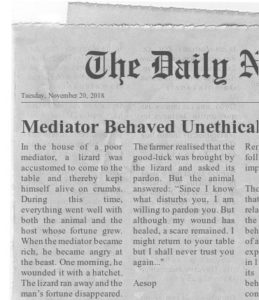In the house of a poor man, a lizard was accustomed to come to the table and thereby kept himself alive on crumbs. During this time, everything went well with both the animal and the host whose fortune grew.
When the farmer became rich, he became angry at the beast. One morning, he wounded it with a hatchet. The lizard ran away and the man’s fortune disappeared. The farmer realised that the good-luck was brought by the lizard and asked its pardon. But the animal answered: “Since I know what disturbs you, I am willing to pardon you. But although my wound has healed, a scare remained. I might return to your table but I shall never trust you again.”
Impossibility of Remaining Impartial
The following lines are a sequel of my previous post addressing the issue of mediators’ ethics mainly in the light of impartiality and independence. So far, we have pinned down the fact that neutrality is an essential quality requirement of mediators. This could be hardly questioned. Almost everybody would agree that mediator should be and remain impartial and independent.
Yet it is not the basic definition of such obligation that is troublesome. The complications appear when we are about to apply the rule.

Impartiality, on the other hand, is unusual and somehow artificial. We have to learn it, especially when being mediators, arbitrators, and referees – roles requiring neutrality. This can be rather challenging and tricky, especially for the freshmen. And yet, one misstep and your career as a mediator is ruined. As sais the moral of the Aesop’ fable in the opening of this post.
Now, we know that a mediator has to remain impartial and that from the psychological point of view, this goes contrary to his nature. To make the situation even worse, it is very difficult to distinguish what kind of behaviour is crossing the lines and what kind of situation is off-field. Unfortunately, this kind of query is what matters most.
Traffic Lights Out-of-order
 Regrettably, the mediators are not provided with a tool similar to the IBA Guidelines on Conflicts of Interest In International Arbitration. This document puts together the basic rules and situation there are to be followed by arbitrators when dealing with the conflict of interest. It provides the neutrals, lawyers, ADR institutions and national judges with a useful set of practical directions on how to proceed in conflicting cases. Apart from general guidance, it contains three lists of specific situations that might occur in the international milieu.
Regrettably, the mediators are not provided with a tool similar to the IBA Guidelines on Conflicts of Interest In International Arbitration. This document puts together the basic rules and situation there are to be followed by arbitrators when dealing with the conflict of interest. It provides the neutrals, lawyers, ADR institutions and national judges with a useful set of practical directions on how to proceed in conflicting cases. Apart from general guidance, it contains three lists of specific situations that might occur in the international milieu.
The gravest conflicts are listed on the Red List. In such cases, the respective person cannot act as an arbitrator and/or should resign. The Orange List enumerates situations requiring the notification of the parties. Should they express their will that the respective person will not act as arbitrator, she cannot proceed. Otherwise, she is free to go. Finally, the Green List gives some examples of situations that do note requires revealment to the parties unless there are some aggravating circumstances.
The easy structure of IBA Guidelines resembles the traffic lights and thus, their application is considered user-friendly. As such, they are very popular and their application has spread worldwide.
As long as there is no such document related to mediation, their limited application is definitely possible also to consensual dispute resolution. On the other hand, one cannot just find and replace “arbitrator” for “mediator” in the text of the Guidelines. Such a broad and indiscriminate application would leave us with a defective traffic-light.
Does it Matter?
 As a matter of example, let’s take the very first situation on Non-Waivable Red List.
As a matter of example, let’s take the very first situation on Non-Waivable Red List.
1.1There is an identity between a party and the arbitrator, or the arbitrator is a legal representative or employee of an entity that is a party in the arbitration.
While this makes perfect sense in arbitration, it would be at least awkward in mediation:
1.1There is an identity between a party and the mediator, or the mediator is a legal representative or employee of an entity that is a party in the arbitration.
The first part of the rule does not make any sense in this form: Identity between a party and the mediator is a nonsense. Such a situation would not be a mediation at all but merely a negotiation and hardly defective. The other part of the sentence is, in contrary, perfectly valid for mediation too. Despite similar anecdotical cases, the IBA Guidelines on Conflict of Interest are so far the best we have got and their careful application can give some guidance to puzzled mediators.
European Code of Conduct
The tool that gives certain, yet limited guidance to mediators is the European Code of Conduct for Mediators issued by the European Commission. This non-binding codex enumerates general deontological duties of mediators and it addresses the issue of independence and impartiality too. In quite an interesting way, Article 2 of said Code addresses the obligation of independence and obligation of impartiality separately.
In accordance with the theoretical approach described in my previous post, the duty of independence is related to the absence of all of the following circumstances: “any personal or business relationship [of Mediator] with one or more of the parties; any financial or other interest [of Mediator], direct or indirect, in the outcome of the mediation; the mediator, or a member of his firm, having acted in any capacity other than mediator for one or more of the parties.” In the following sub-article, the European Code of Conduct for Mediators explains the problematic of impartiality: “Mediators must at all times act, and endeavour to be seen to act, with impartiality towards the parties and be committed to serve all parties equally with respect to the process of mediation.” Thus, the Code is one of the rare instruments that implicitly distinguishes the difference between the two terms. On the other hand, it does not provide for the more concrete and detailed application that is most desired.
What is Your Gut Feeling?
OK, what to do if you will find the answer neither in the IBA Guidelines nor in the Code? There is quite an extensive list of less formal ethical standards and tools that might help in critical and threshold situations. Those auxiliary instruments might shed some light on different shades of neutrality. One of the advantages of such approaches is their flexibility.
First of them is an Mentor Approach based on hypothetical decision-making procedure of some admired personality. This might recruit among more senior colleagues, professors from the university and even among some historical or fictional characters. The method is constituted by a single question: “What would be an approach taken by that person in a similar situation?” The answer is obviously a sub-conscious analysis of given circumstances, moral stands, a perception of history and not an attempted historical research.
The second tool is called an Gut Test. Being ethical is clearly not a matter of following one’s own feelings – frequently emotions deviate from what is ethical. On the other hand, there is a certain informative value in the way one is feeling about the situation. If by considering the circumstances, one “does have a bad gut feeling”, he or she should definitely pay more attention to the case. This approach too is profiting from a subconscious perception of the situation.
Front Page of a Local Paper
 My favourite method known as the Newspaper Test was introduced by the US tycoon Warren Buffett:
My favourite method known as the Newspaper Test was introduced by the US tycoon Warren Buffett:
“I want employees to ask themselves whether they are willing to have any contemplated act appear the next day on the front page of their local paper – to be read by their spouses, children and friends – with the reporting done by an informed and critical reporter.”
The usefulness of this test is based on the fact that it is not only taking into consideration your own ethical standards, but also the sense of self-perception by the closest relatives.
Last but not least, another useful ethical tool is known as the Golden Rule. Despite the fact that it is less flexible and certainly more rigid, its application is easier. It is basically only a simple ethical principle that is to be followed in certain situation notwithstanding the circumstances. I used one of them as a title to my previous blog: “Caesar’s wife must be above suspicion.” This sentence gives a quite straightforward view to strictness that shall be applied to mediators’ and arbitrators’ neutrality. Another Golden Rule is the sentence the author of this post was told by one of the leading Italian professors on arbitration law: “You only have one name. Once damaged, forever damaged…” Remember the moral of the Aesop Fable: “I might return to your table but I shall never trust you again.”
Read more:
LUCY, W.: The Possibility of Impartiality, in Oxford Journal of Legal Studies, Vol. 25, No. 1 (2005), pp. 3–31.
________________________
To make sure you do not miss out on regular updates from the Kluwer Mediation Blog, please subscribe here.



